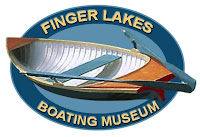 The Board of Directors of the Finger Lakes Boating Museum in Geneva, NY has established a Site Development Committee and are moving forward with ambitous plans for a facility to research, document, preserve, and share the boating history of the Finger Lakes region. The Museum reached agreement with the City of Geneva last fall to establish a permanent home on the Geneva waterfront in association with the Visitor Center. The facility will be located on the current Chamber of Commerce site. The Museum anticipates occupying approximately 20,000 square feet of space initially, with future expansion on the lakefront and off-site eventually growing to approximately 60,000 square feet of space.
The Board of Directors of the Finger Lakes Boating Museum in Geneva, NY has established a Site Development Committee and are moving forward with ambitous plans for a facility to research, document, preserve, and share the boating history of the Finger Lakes region. The Museum reached agreement with the City of Geneva last fall to establish a permanent home on the Geneva waterfront in association with the Visitor Center. The facility will be located on the current Chamber of Commerce site. The Museum anticipates occupying approximately 20,000 square feet of space initially, with future expansion on the lakefront and off-site eventually growing to approximately 60,000 square feet of space.
Newly elected board president Bill Oben said the Museum has assembled a collection of more than 90 wooden boats built in the Finger Lakes over the past 100 years, as well as numerous related artifacts and extensive reference material. Portions of the collection will be displayed on a rotating basis within the new facility. Also planned are interactive workshops and displays to engage visitors in the design, construction and use of the boats and an active on-water program including sailing and small boat handling.
The board also elected a new slate of officers and appointed four new directors at its January 4th. The officers for 2010 are Bill Oben as President, Ed Wightman as Vice President, Bill Smith as Secretary and Dennis Karalow as Treasurer. The new directors are Chrissy Bennett-West, Dave Bunnell, Vince Scalise and Bruce Tuxill.
Bennett-West is a Geneva native and a graduate of William Smith College. A long-time member of the Seneca Yacht Club, she sails Thistles and serves on the Executive Board as Vice Commodore. She and her husband live in Canandaigua where she is employed as a Special Education teacher in the Canandaigua School System.
Dave Bunnell relocated to Geneva following a 40-year career in law and business. He has practiced law with two commercial law firms in Dallas, Texas, served in senior management positions with international food companies, and engaged in various entrepreneurial activities. He is currently involved with others in efforts to accelerate the revitalization of downtown Geneva. He serves on the Boards of Geneva Growth, the Finger Lakes Regional Arts Council and the Business Improvement District.
Vince Scalise, a Geneva native and Korean War veteran, retired as Superintendent of the Geneva City School System. He has served on numerous boards including Cayuga-Seneca Canalway Trail Association, YMCA, Geneva Growth, Geneva Historical Society, United Way of Rochester and Ontario County, the Geneva Area Chamber of Commerce, and the FL Cultural & Natural History Museum. He has also served on the Geneva City Council.
Bruce Tuxill returned to his native Geneva in 2008 following a 40-year career in the Air Force and Air National Guard. At the time of his retirement he was serving as the Adjutant General of the Maryland National Guard. He is currently the President of the Tuxill Group, which provides consulting service for federal, state and local officials in the areas of national defense and homeland security. He currently serves on the Board of the Boys and Girls Clubs of Geneva and the Vestry of Trinity Episcopal Church.
Bill Oben, is a founding trustee who has served as president of the 300-member Museum since 2007, commented that the organization is “excited about establishing a permanent home for the museum on the Geneva waterfront. We intend to create a world class facility highlighting the boating heritage of the Finger Lakes region,” Oben said.
 Adirondack Architectural Heritage (AARCH) is kicking-off their 2010 educational series with an interpretive cross-country ski into the 19th-century, Adirondack Great Camp, Camp Santanoni, located in the New York State Forest Preserve. Participants will learn about the camp’s history and architectural significance that make it. The 10-mile round trip ski, along the preserve’s gently sloping historic carriage road, leads into the majestic wilderness estate and a National Historic Landmark. Participants will be able to visit the camp’s three complexes- the Gate Lodge, the Farm, and view the massive log retreat at the Main Camp, the work of architect Robert Robertson. They will also see the authentic Adirondack rustic interiors and learn about the restoration of the camp.
Adirondack Architectural Heritage (AARCH) is kicking-off their 2010 educational series with an interpretive cross-country ski into the 19th-century, Adirondack Great Camp, Camp Santanoni, located in the New York State Forest Preserve. Participants will learn about the camp’s history and architectural significance that make it. The 10-mile round trip ski, along the preserve’s gently sloping historic carriage road, leads into the majestic wilderness estate and a National Historic Landmark. Participants will be able to visit the camp’s three complexes- the Gate Lodge, the Farm, and view the massive log retreat at the Main Camp, the work of architect Robert Robertson. They will also see the authentic Adirondack rustic interiors and learn about the restoration of the camp. 

